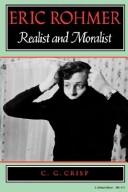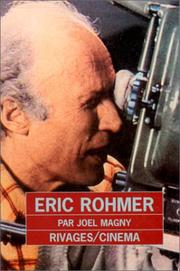| Listing 1 - 10 of 24 | << page >> |
Sort by
|
Book
Year: 1983 Publisher: Amsterdam Stichting Cinemathema
Abstract | Keywords | Export | Availability | Bookmark
 Loading...
Loading...Choose an application
- Reference Manager
- EndNote
- RefWorks (Direct export to RefWorks)
Film --- Rohmer, E.
Book
Publisher: Paris Lherminier
Abstract | Keywords | Export | Availability | Bookmark
 Loading...
Loading...Choose an application
- Reference Manager
- EndNote
- RefWorks (Direct export to RefWorks)
Film --- Rohmer, E.
Dissertation
Abstract | Keywords | Export | Availability | Bookmark
 Loading...
Loading...Choose an application
- Reference Manager
- EndNote
- RefWorks (Direct export to RefWorks)
Book
ISBN: 2256908429 9782256908422 Year: 1986 Publisher: Paris Minard
Abstract | Keywords | Export | Availability | Bookmark
 Loading...
Loading...Choose an application
- Reference Manager
- EndNote
- RefWorks (Direct export to RefWorks)

ISBN: 0253319080 Year: 1988 Publisher: Bloomington Indiana university press
Abstract | Keywords | Export | Availability | Bookmark
 Loading...
Loading...Choose an application
- Reference Manager
- EndNote
- RefWorks (Direct export to RefWorks)
Dissertation
Abstract | Keywords | Export | Availability | Bookmark
 Loading...
Loading...Choose an application
- Reference Manager
- EndNote
- RefWorks (Direct export to RefWorks)
Dissertation
Abstract | Keywords | Export | Availability | Bookmark
 Loading...
Loading...Choose an application
- Reference Manager
- EndNote
- RefWorks (Direct export to RefWorks)

ISBN: 2869309112 9782869309111 Year: 1995 Publisher: Paris Rivages
Abstract | Keywords | Export | Availability | Bookmark
 Loading...
Loading...Choose an application
- Reference Manager
- EndNote
- RefWorks (Direct export to RefWorks)
Motion pictures --- Rohmer, Éric, --- Rohmer, Eric --- Criticism and interpretation.
Book
ISBN: 9782841747825 2841747824 Year: 2017 Publisher: Paris : Editions Kimé,
Abstract | Keywords | Export | Availability | Bookmark
 Loading...
Loading...Choose an application
- Reference Manager
- EndNote
- RefWorks (Direct export to RefWorks)
Inscrit dans ce que l'on appelle "le cinéma moderne", Eric Rohmer n'a cessé de revendiquer son classicisme. Le paradoxe se comprend par la force structurante de la référence à la littérature libertine, qui explique le récit rohmérien comme les rapports entre les personnages. Cette réédition augmentée du Spectateur séduit le confirme à travers l'analyse des films des années deux mille et celle de nombreux écrits inédits conservés à l'IMEC. Apparaît alors un nouveau Rohmer, lecteur de Sade - ce dont témoigne le court texte publié ici pour la première fois, "Les infortunes de la vertu. D'après une oeuvre célèbre du XVIIIe siècle français" - et cinéaste-écrivain, dont la démarche créatrice explore les limites entre littérature et cinéma. Au-delà de la connaissance de l'oeuvre, l'enjeu est ici théorique. Qu'est-ce que la séduction ? Ce livre propose une réponse originale : séduire, c'est capter le désir de l'autre en donnant son propre désir en représentation. Partant de cas concrets, l'auteur définit une forme de séduction dont le principe est l'ambiguïté. Le modèle anthropologique qui se dégage du comportement des personnages est transposé sur un plan esthétique. La séduction doit alors être comprise comme une théorie de la représentation dans laquelle la place du spectateur est en jeu : ni leurré, ni démystifié, le spectateur du film est séduit. Comme le montrent les "figures théorisantes" qui mettent en abyme le fonctionnement de l'illusion, Rohmer nous confronte au réalisme ontologique bazinien dans une reformulation dynamique de l'ambiguïté. Cet ouvrage permettra de redécouvrir un cinéma que l'on renvoie parfois à la transparence et qui est pourtant intéressé par l'artifice.
Cinematography --- Libertinism --- Rohmer, Éric, --- Séduction --- Libertinage --- Au cinéma --- Rohmer, Éric, --- Au cinéma. --- Rohmer, Éric, - 1920-2010
Book
ISBN: 1474221149 9781474221146 9781474221153 1474221157 9781474221122 1474221122 9781474221139 1474221165 1474221130 Year: 2016 Publisher: London
Abstract | Keywords | Export | Availability | Bookmark
 Loading...
Loading...Choose an application
- Reference Manager
- EndNote
- RefWorks (Direct export to RefWorks)
Rohmer is one of the most popular French directors of the second half of the 20th century. One of the members of the famous Nouvelle Vague that reconstituted French cinema based on the theoretical principles articulated in the Cahiers du Cinema, he was fired when as a conservative Catholic he opposed its turn toward politicization. Like some of his colleagues, Rohmer is extremely interested in both the history and the philosophy of film. Brother of the noted French philosopher Rene Scherer, he begins his career as a film critic. In his films, deep moral conflicts as well as the search for one's own identity emerge from the intricacies of seemingly superficial everyday life interactions, particularly between a man and a woman. Hosle's book puts Rohmer in the context of a long French tradition of reflected eroticism, with Marivaux, Musset, Stendhal, and Jean Renoir as crucial figures, and shows how Rohmer both recognizes the inner logic of eroticism and subjects it to moral demands that he inherits from his Catholic background. For Rohmer, the tension between the two can usually only be solved by some unexpected event that can be interpreted as an equivalent of grace.
Motion pictures --- Philosophy. --- Rohmer, Éric, --- Cordier, Gilbert, --- Scherer, Jean-Marie Maurice, --- Criticism and interpretation. --- Philosophy --- Rohmer, Eric, --- Rohmer, Éric --- Motion pictures - Philosophy --- Rohmer, Eric, - 1920-2010
| Listing 1 - 10 of 24 | << page >> |
Sort by
|

 Search
Search Feedback
Feedback About UniCat
About UniCat  Help
Help News
News